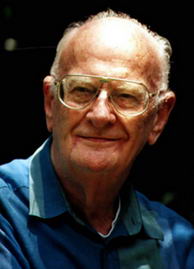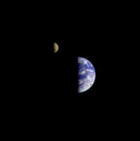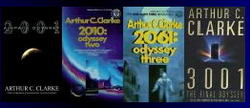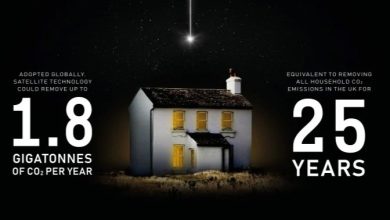Fallece Arthur C. Clarke: Escritor visionario

Una mentalidad aguda y creativa que supo prever el futuro en sus escritos. El autor, normalmente reconocido por su novela 2001: Odisea en el espacio, murió hoy dejando un gran legado tras de sí.
Varias veces mencionamos los enormes parecidos entre la Ciencia Ficción y la realidad. Nos encanta descubrir que muchos autores han podido predecir en su imaginario el futuro de la tecnología. Sir Arthur Charles Clarke fue uno de esos autores y ha sido ampliamente reconocido por sus aportes a la ciencia (y al placer de los lectores).
Clarke escribió más de 80 libros de ficción y temas reales, más de 100 historias cortas y cientos de artículos y ensayos. Mientras sus novelas más famosas son "El fin de la Infancia", "Cita con Rama" y "2001: Odisea en el Espacio" (ganando premios como el Nebula, Hugo, CBE y siendo nombrado "Gran Maestro" de los escritores de ciencia ficción en EEUU) el reconocimiento del mundo académico vino de la mano de un concepto sobre telecomunicaciones satelitales publicado en la revista "Wireless World" en 1945.
En su escrito, basado en el concepto de los satélites geosíncronos, Clarke propagó la idea de que serían ideales para una red de telecomunicaciones mundiales basadas en satélites orbitando la tierra a 22.300 millas de altura. No satisfecho con ser el padrino de las telecomunicaciones satelitales, también escribió novelas que describen detalles técnicos e implicancias sociales de los vuelos espaciales y uso de cohetes. En reconocimiento a estas contribuciones, la órbita geoestacionaria es oficialmente reconocida como "órbita de Clarke" por la Unión Astronómica Internacional y fue convertido en socio honorario del Instituto Estadounidense de Aeronáutica y Astronáutica.
Fue especialista de radares en la segunda guerra mundial, se graduó en Matemáticas y Física en el King's College de Londres y fue presidente de la Sociedad Interplanetaria Británica. En 1958 comenzó a escribir ensayos en varias revistas que se convirtieron luego en el libro "Perfiles del futuro" que describen sus visiones e invenciones (entre las que pueden encontrarse alunizajes, máquinas traductoras, vida artificial, inmortalidad, energía inalámbrica, inteligencia artificial que supera al hombre, entre otros)
La visión clara y optimista de Clarke sobre las formas en que la ciencia podía mejorar la exploración humana le ganó el respeto de la comunidad científica. Y aunque sus aportes en el tema han sido muchos, él atesoraba su vuelo literario: "A veces me preguntan cómo me gustaría ser recordado. Tengo una carrera diversa como escritor, explorador submarino y promotor espacial. De todas estas cosas, me gustaría ser recordado como un escritor", dijo Clarke recientemente.
Afectado desde 1988 por un síndrome postpolio, Clarke continuó su trabajo conminado a una silla de ruedas. Murió a los 90 años por problemas respiratorios en Sri Lanka, el 19 de Marzo, a la 1:30AM. Seguirá siendo recordado, si no por sus talentos, por sus visiones a medida que se vayan haciendo realidad.
 |
|
"No es fácil ver como podrán sobrevivir las formas extremas de nacionalismo cuando la humanidad ha visto a la Tierra en su verdadera perspectiva, como un único pequeño globo en las estrellas" |
Notas del editor
Citas célebres de Arthur C. Clarke:
– "Aún tiene que probarse que la inteligencia tenga algún valor para la supervivencia"
– "Cualquier tecnología suficientemente avanzada es indistinguible de la magia"
– "Cuando un científico prestigioso pero anciano afirma que algo es imposible, lo más probable es que esté equivocado."
– "La inteligencia del planeta es constante, y la población sigue aumentando."
– "Los microprocesadores se están metiendo en todo. En un futuro cercano no habrá ningún accesorio -salvo una escoba, acaso- que no tenga un procesador dentro."
– "Los políticos deberían leer ciencia ficción, no westerns o historias de detectives."
– "No creo en Dios pero estoy muy interesado en él."
– "Qué inapropiado llamar Tierra a este planeta, cuando es evidente que debería llamarse Océano."
– "Una fe que no pueda sobrevivir la colisión con la verdad no vale muchos arrepentimientos".
– "Cualquier profesor que pueda ser sustituido por una máquina, debería ser sustituido por una máquina."
Bibliografía:
Series – Space Trilogy
1. Islands in the Sky (1952)
2. Earthlight (1955)
3. Sands of Mars (1951)
4. Space Trilogy (omnibus) (2001)
 Series – Space Odyssey
Series – Space Odyssey
1. 2001: A Space Odyssey (1968)
2. 2010: Odyssey Two (1982)
3. 2061: Odyssey Three (1985)
4. 3001: The Final Odyssey (1996)
Series – Rama
1. Rendezvous with Rama (1972)
2. Rama II (1989) (con Gentry Lee)
3. The Garden of Rama (1991) (con Gentry Lee)
4. Rama Revealed (1993) (con Gentry Lee)
Series – Time Odyssey (con Stephen Baxter)
1. Time's Eye (2003)
2. Sunstorm (2005)
3. Firstborn (2007)
Arthur C Clarke's Venus Prime (con Paul Preuss)
1. Breaking Strain (1987)
Novelas
Prelude to Space o Master of Space(1951)
Childhood's End (1953)
Against the Fall of the Night (1953)
The Deep Range (1954)
The City and the Stars (1956)
A Fall of Moondust (1961)
Glide Path: To The Heart of Experimental Technology…In WWII! (1963)
Dolphin Island: A Story of the People of the Sea (1963)
The Space Dreamers (1969)
Imperial Earth (1975)
The Fountains of Paradise (1978)
Cradle (1987) (with Gentry Lee)
The Ghost from the Grand Banks (1990)
Beyond the Fall of Night (1990) (with Gregory Benford)
The Hammer of God (1993)
Richter 10 (1996) (with Mike McQuay)
The Trigger (1999) (with Michael P Kube-McDowell)
The Light of Other Days (2000) (with Stephen Baxter)
The Last Theorem (2008)
Omnibus
From the Ocean, From the Stars (1962)
Prelude to Mars (1965)
An Arthur C. Clarke second omnibus (1968)
The City and the Stars / The Sands of Mars (2001)
The Dark Blue Depths: Adventures from Inner to Outer Space (2005)
Clarke's Universe: Lion of Comarre / Fall of Moondust (2006)
Colecciones
Expedition to Earth (1953)
Reach for Tomorrow (1956)
Tales from the White Hart (1957)
The Other Side of the Sky (1958)
Across the Sea of Stars (1959)
Tales of Ten Worlds o Tales From the Ten Worlds (1962)
The Nine Billion Names of God (1967)
The Lion of Comarre: And Other Stories (1968)
Earthlight and Other Stories (1971)
The Wind from the Sun (1972)
Of Time and Stars (1972)
The Best of Arthur C Clarke 1932-1955 (1973)
Best of Arthur C. Clarke: 1956-1972 (1977)
Four Great SF Novels (1978)
Possessed: And Other Stories (1978)
Arthur C. Clarke: 2001, A Space Odyssey; The City and the Stars; The Deep Range, A Fall of Moondust; Rendezvous With Rama (1980)
Lion of Comarre / Against the Fall of Night (1982)
The Sentinel (1982)
More Than One Universe (1985)
The Songs of Distant Earth: And Other Stories (1986)
The Best Short Stories of Arthur C. Clarke (1988)
Tales from Planet Earth (1989)
A Meeting with Medusa: And Other Stories (1990)
The Arthur C. Clarke Collection: 2001 a Space Odyssey/Transit of Earth/Fountains of Paradise/Childhood's End (1995)
The Collected Stories of Arthur C. Clarke (2001)
The Ghost from the Grand Banks and the Deep Range (2001)
The Shining Ones: And Other Stories (2001)
Antologias
Time Probe: The Sciences in Science Fiction (1967)
Three for Tomorrow (1970)
The Science Fiction Hall of Fame Volume Four (1981) (with George W Proctor)
Project Solar Sail (1986) (with David Brin)
Hal's Legacy (1996) (with David G Stork)
The Best of Sci-Fi and Fantasy (1999) (with Orson Scott Card)
Divulgación científica
Interplanetary Flight (1950)
The Exploration of Space (1951)
The Exploration of the Moon (1954)
The Young Traveller in Space o Going Into Space (1954)
The Making of a Moon (1957)
Boy Beneath the Sea (1958)
The Challenge of the Spaceship (1958)
Voice Across the Sea (1958)
The Challenge of the Sea (1960)
The First Five Fathoms (1960)
Indian Ocean Adventure (1961)
Profiles of the Future (1962)
Indian Ocean Treasure (1964) (with Mike Wilson)
Voices from the Sky (1965)
The Coming of the Space Age (1967)
Man and Space: Life Science Library (1967)
The Promise of Space (1968)
2001: Filming the Future (1968) (with Piers Bizony)
First on the Moon (1970)
Into Space (1971) (with Robert Silverberg)
Report on Planet Three: And Other Speculations (1972)
The Lost Worlds of 2001 (1972)
Beyond Jupiter (1972) (with Chesley Bonestell)
2001 and Beyond (1975)
Technology and the Frontiers of Knowledge (1975)
The View from Serendip (1977)
Mysterious Worlds (1980)
Arthur C. Clarke's Mysterious World (1981) (with John Fairley and Simon Welfare)
Arthur C. Clarke's World of Strange Powers (1981) (with John Fairley)
1984 Spring: A Choice of Futures (1984)
Ascent to Orbit: Scientific Autobiography – Technical Writings of Arthur C.Clarke (1984)
The Odyssey File (1984) (with Peter Hyams)
Frontline of Discovery: Science on the Brink of Tomorrow (1985)
Arthur C. Clarke's July 20, 2019: Life in the 21st Century (1986)
Arthur C. Clarke's chronicles of the strange and mysterious (1987) (with John Fairley)
Astounding Days: A Science Fictional Autobiography (1988)
How the World Was One: Beyond the Global Village (1988)
The Worlds of Galileo (1988)
An Encyclopedia of Claims, Frauds, and Hoaxes of the Occult and Supernatural: James Randi's Decidedly Skeptical Definitions of Alternate Realities (1992) (with James Randi)
The Fantastic Muse (1992)
By Space Possessed (1993)
Arthur C. Clarke's A-Z of Mysteries (1994)
The Snows of Olympus: A Garden on Mars (1994)
The Colours of Infinity (1994)
The Apollo 11 Moon Landing (1994)
The Supernatural A-Z (1995) (with James Randi)
Macroshift: Navigating the Transformation to a Sustainable World (1997)
Arthur C. Clarke and Lord Dunsany: A Correspondence (1998) (with Lord Dunsany)
Arthur C. Clarke's Mysteries (1998) (with John Fairley and Simon Welfare)
Welcome to the Wired World: The New Networked Economy (1999)
Greetings, Carbon-Based Bipeds! (1999)
Sri Lanka: The Emerald Island (2000)
Arthur C. Clarke and C. S. Lewis: A Correspondence (2001) (with C S Lewis)
Moonwatcher's Memoir: A Diary of 2001, a Space Odyssey (2002) (with Dan Richter)
From Narnia to a Space Odyssey: The War of Letters Between Arthur C. Clarke and C.S. Lewis (2003) (with C S Lewis)
Series de divulgación científica – Blue Planet
1. The Coast of Coral (1956)
2. Reefs of Taprobane (1957)
3. The Treasure of the Great Reef (1964)
En adición, Clarke escribió alrededor de cien historias cortas, algunas de las cuales pueden ser conocidas en "Short stories by Arthur C. Clarke".
Enlaces relacionados (gracias a wikipedia.org):
– Institute for Cooperation in Space (en inglés)
– The Arthur C. Clarke Foundation (en inglés)
– Página No Autorizada de Arthur C. Clarke en castellano
– Transmisiones Extraterrestres (traducción al castellano de Extra-terrestral Relays)
– Interview for The Onion (Febrero 2004) (en inglés)
– The Motif of First Contact in Arthur C. Clarke's SF Works, by Zoran Živković (en inglés)
– Sir Arthur C. Clarke links at MysteryVisits.com (en inglés)
– Clarke image archive at MysteryVisits.com (en inglés)
– 2000 Photo
– Esquela de Arthur C. Clarke
Fuente: Constanza Villanueva – neoteo.com




